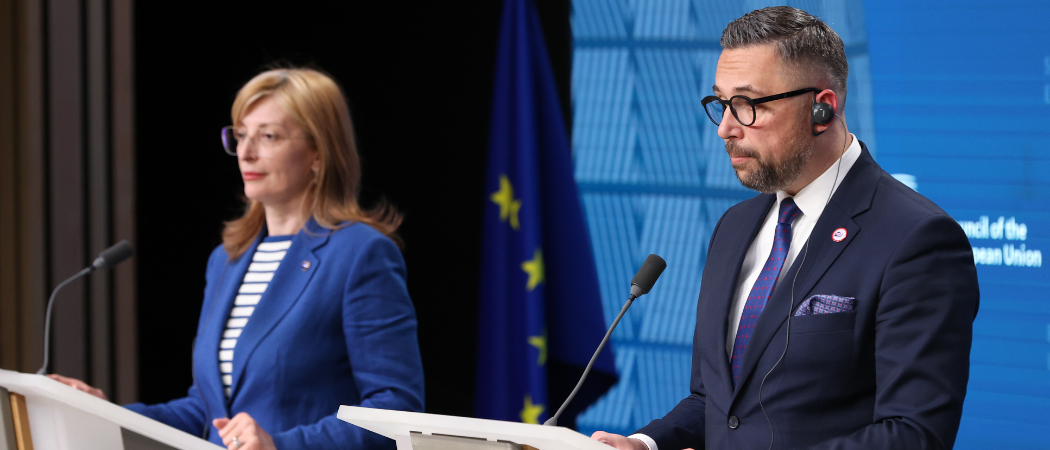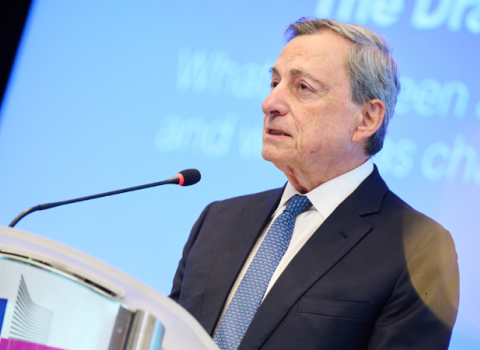Research ministers welcome Commission’s commitment to a standalone FP10, and call for collaborative research to have a central role

From left to right:European commissioner for Startups, Research and Innovation Ekaterina Zaharieva (left) and Polish State Secretary, Ministry of State Assets, Marcin Kulasek. Photo credits: European Union
EU research ministers have welcomed Ursula von der Leyen’s confirmation that Framework Programme 10 will remain a standalone programme, and pledged to hold the Commission president to her word after meeting on May 23 to discuss the recently released interim evaluation of Horizon Europe.
“The devil is in the detail,” said Poland’s science minister Marcin Kulasek, who chaired the meeting. Looking ahead to the Commission’s detailed proposals for future EU financial instruments, due this summer, he promised the Council would “scrutinise them and negotiate them thoroughly.”
Von der Leyen brought an end to months of uncertainty last week when she said the EU’s research and innovation programme would remain independent, but she added it would be “tightly connected” to the European Competitiveness Fund.
During Friday’s meeting, ministers reiterated their support for an independent programme, which they called for in March’s Warsaw Declaration. “It’s absolutely indispensable for the Framework Programme to be maintained in the next [Multiannual Financial Framework], and this has to be linked to the Competitiveness Fund, but we need to know the details,” Spanish science minister Diana Morant said during the debate.
Ministers particularly stressed the need to continue supporting collaborative research in FP10. The interim evaluation published earlier this month found that 81% of funding so far has gone to collaborative projects, primarily in Pillar 2 of the programme, but the Commission remains tight-lipped about how these will be supported in FP10.
Member states were clear that additional funding for the European Research Council (ERC) and the European Innovation Council (EIC) should not come at the expense of Pillar 2. “The ERC and the EIC are very important instruments, but the main source of added value is the transnational collaboration piece [of the programme],” Ireland’s science minister, James Lawless, said during the discussion.
“Supporting and enhancing cooperation must remain at the core of European research and innovation,” agreed Finland’s minister of economic affairs, Wille Rydman, while Spain’s Morant called Pillar 2 a “powerful tool of global science.”
Member states agreed on the need to accelerate the participation of companies in the Framework Programme, particularly SMEs, which can play a key role in transforming research into innovative products.
They want to see support across the full value chain from fundamental research to innovation and scaling up. “Europe cannot be strong in industry and innovation without being strong in science,” said Danish science minister Christina Egelund.
Dual use
The question of opening up the Framework Programme to dual-use technologies, with civil and military applications, was high on the agenda of the meeting, which was chaired by the Polish presidency of the EU Council. Member states remain divided on the issue, but there is a growing acknowledgement that many of the new technologies funded by EU programmes, from artificial intelligence to advanced batteries, are inherently dual use in nature.
Lithuania is among the countries that strongly support opening up the programme to dual-use projects. “As more national and EU funding shifts to defence, we must achieve more with the same resources,” said vice-minister of science, Regina Valutytė.
Related articles:
- Budget first, impact later: academic community reacts to Horizon Europe analysis
- Commission touts Horizon Europe’s economic impact in interim evaluation
- EU ministers call for independent FP10 in Warsaw Declaration
Others are open to the idea of reviewing Horizon Europe’s exclusive civilian focus, but believe more discussions and safeguards are needed.
“We have to take the geopolitical situation as a reason to enable dual-use research in the future,” said Austrian research minister Eva-Maria Holzleitner, who welcomed the Commission’s proposal to fund dual-use projects through the EIC. However, she added that Austria does not support funding purely defence research in the Framework Programme, and said the EU should also support research into civil security, conflict prevention and peacekeeping.
Similarly, Dutch science minister Eppo Bruins backed more cross-fertilisation between civil and defence research, but said any changes to the EIC’s role should be carefully studied before taking a decision for FP10. “For us, it is essential that civil applications remain the starting point and continue to be part of dual-use activities to be financed in the EIC. For activities with only military applications, programmes such as the European Defence Fund and InvestEU are better suited,” he said.
Even Ireland, which wants to retain the civilian focus in FP10, recognises the “increased opportunities for cross-fertilisation of civilian and defence, and the potential benefits for Europe’s competitiveness and security,” said Lawless.
Meanwhile, several ministers welcomed the introduction of lump-sum funding as a tool for administrative simplification, and called for more efforts to increase the participation of women, particularly in leading scientific roles.
They also reiterated the importance of increasing funding for research and innovation. In the first half of Horizon Europe, 70% of excellent projects went unfunded.
AI in science
The meeting also saw ministers approve Council conclusions on the future EU strategy for AI in science, currently being developed by the Commission.
The strategy should focus on interdisciplinary research ecosystems, upskilling researchers and ensuring open access to reliable data, the ministers said. They highlighted the importance of developing dedicated AI systems for scientific applications and better involving the research and innovation community in the ecosystem around Europe’s AI factories.
The conclusions highlight the “transformative potential” of AI for stimulating knowledge and driving innovation deployment, while also acknowledging risks related to unethical use of algorithms, data manipulation, generation of factual errors and bias. The EU should therefore focus on promoting “responsible, ethical, sustainable and inclusive” use of AI systems.
The Council also endorsed the European Research Area (ERA) policy agenda for 2025-27, which contains 11 long-term ERA structural policies in areas such as open science and reforming research assessments, and eight goal-oriented ERA actions from advancing AI in science to enhancing research security.
Research commissioner Ekaterina Zaharieva attended the Council meeting to present some of the regional, national and EU schemes that have been set up to attract international researchers as part of the Choose Europe for Science initiative. These initiatives can now be viewed on the EURAXESS portal.
Zaharieva also announced plans for a new call for ERA Chairs worth €230 million under the Horizon Europe work programme for 2026-27. If endorsed by member states, this would double the budget of the previous call, and attract up to 120 researchers and research managers to universities and research centres in countries with low research and innovation performance.
Editor's note: This article was updated 28 May 2025 to correct a quote from Spanish science minister Diana Morant. A previous version relied on a live English interpretation of Morant’s comments





 A unique international forum for public research organisations and companies to connect their external engagement with strategic interests around their R&D system.
A unique international forum for public research organisations and companies to connect their external engagement with strategic interests around their R&D system.